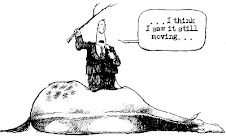And as I recently posted a few films that were recommended to me that I have not seen, with the recommendation, I thought I would do the same for some books.
Again, I have not seen hem and cannot vouch for them... I am copying the recommendations here so that I can keep track of them and that others may benefit from the critique as well.
*
Brooklyn Follies (great writing, style and themes)
by Paul Auster
From Publishers Weekly
Starred Review. Nathan Glass, a retired life insurance salesman estranged from his family and facing an iffy cancer prognosis, is "looking for a quiet place to die. Someone recommended Brooklyn." What he finds, though, in this ebullient novel by Brooklyn bard Auster (Oracle Night), is a vital, big-hearted borough brimming with great characters. These include Nathan's nephew, Tom, a grad student turned spiritually questing cab driver; Tom's serenely silent nine-year-old niece, who shows up on Tom's doorstep without her unstable mom; and a flamboyant book dealer hatching a scheme to sell a fraudulent manuscript of The Scarlet Letter. As Nathan recovers his soul through immersion in their lives, Auster meditates on the theme of sanctuary in American literature, from Hawthorne to Poe to Thoreau, infusing the novel's picaresque with touches of romanticism, Southern gothic and utopian yearning. But the book's presiding spirit is Brooklyn's first bard, Walt Whitman, as Auster embraces the borough's multitudes—neighborhood characters, drag queens, intellectuals manqué, greasy-spoon waitresses, urbane bourgeoisie—while singing odes to moonrise over the Brooklyn Bridge. Auster's graceful, offhand storytelling carries readers along, with enough shadow to keep the tale this side of schmaltz. The result is an affectionate portrait of the city as the ultimate refuge of the human spirit.
** The Tender Bar (loved the characters – who hasn’t known an “Uncle Charlie?)
by J.R. Moehringer
From Booklist
*Starred Review* People don't buy memoirs to read about happy families. And yet, for those who read a lot of memoirs, it can still be startling to learn both how many people have unhappy families--and how quickly we become inured to those people's pain. It's a rare writer who recollects his trials with clarity and dispassion, giving us not voyeurism but a good look at ourselves. Moehringer, raised poor by his melancholy mother, found himself looking for male role models wherever he could find them--often among the regulars at Publicans, a Manhasset, Long Island, bar that sounds a bit like Cheers with swearing. A Pulitzer Prize-winning journalist, he recalls events as disparate as losing his virginity and getting his first newspaper job (at the New York Times) with a newsman's imperative to get the story. The reconstructed dialogue can be a bit cinematic, but that's a quibble. Funny, honest, and insightful, The Tender Bar finds universal themes in an unusual upbringing and declares a real love of barroom life without romanticizing it too much.
*** March (terrific premise, insight into the times, heartbreaking in spots)
by Geraldine Brooks
From Publishers Weekly
Starred Review. Brooks's luminous second novel, after 2001's acclaimed Year of Wonders, imagines the Civil War experiences of Mr. March, the absent father in Louisa May Alcott's Little Women. An idealistic Concord cleric, March becomes a Union chaplain and later finds himself assigned to be a teacher on a cotton plantation that employs freed slaves, or "contraband." His narrative begins with cheerful letters home, but March gradually reveals to the reader what he does not to his family: the cruelty and racism of Northern and Southern soldiers, the violence and suffering he is powerless to prevent and his reunion with Grace, a beautiful, educated slave whom he met years earlier as a Connecticut peddler to the plantations. In between, we learn of March's earlier life: his whirlwind courtship of quick-tempered Marmee, his friendship with Emerson and Thoreau and the surprising cause of his family's genteel poverty. When a Confederate attack on the contraband farm lands March in a Washington hospital, sick with fever and guilt, the first-person narrative switches to Marmee, who describes a different version of the years past and an agonized reaction to the truth she uncovers about her husband's life. Brooks, who based the character of March on Alcott's transcendentalist father, Bronson, relies heavily on primary sources for both the Concord and wartime scenes; her characters speak with a convincing 19th-century formality, yet the narrative is always accessible. Through the shattered dreamer March, the passion and rage of Marmee and a host of achingly human minor characters, Brooks' affecting, beautifully written novel drives home the intimate horrors and ironies of the Civil War and the difficulty of living honestly with the knowledge of human suffering.
**** ... Not that there isn't room for testosterone fueled emotion among men... Certainly not the pabulum of "a beautiful journey" but I trust you both enough to make the following recommendation: Wally Lamb is an author who wrote "She's come undone" 1992 & "I know this much is true" 1998. In the graveyard where I live an anemic library forced me to pick up "I know this much is true" despite the Spandoau Ballet title and the Opra book club sticker. It is one of the most extraordinary books I've ever read (I just finished it yesterday) It is not the type of book I would normally glance at but I'm looking forward to reading his first book. No big deal but this book really affected me. The book is about two identical twins. One becomes a paranoid scitzo. Their biological father is unknown and the step dad is abusive. Life has battered the "well" twin to point that his marriage is over. He has an old memoir that his Sicilian grandfather wrote and he has it translated to English in an attempt to understand himself. Answers ultimately come but not from expected sources and not always the one's he wants but redemption, forgiveness, and absolution are played out in this emotional human drama. Very well written.






No comments:
Post a Comment